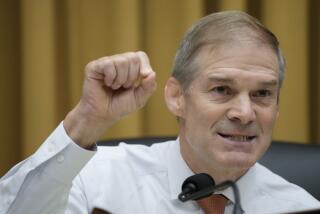Wright Admits Selling 504 Copies of Book to University, Avoiding Honorarium Limit
- Share via
WASHINGTON — House Speaker Jim Wright (D-Tex.) acknowledged Wednesday that he once sold 504 copies of his book to a Texas university instead of taking a speaking fee, thus avoiding a House limit on honorariums and pocketing $1,650 that he otherwise could not have accepted.
Wright’s statement supported charges by his critics that he used a controversial publishing contract for the 1984 book, “Reflections of a Public Man,” to evade congressional limits on outside income since House rules allow unlimited royalty payments.
The episode strengthened the possibility that a House Ethics Committee examining Wright’s financial affairs may decide that the book contract and the sales, which were sometimes made in bulk to political backers, constituted a breach of the congressional standards. His aides said, however, it was an isolated incident.
Decision Likely Next Week
The development came as the ethics panel resumed final deliberations in its nine-month investigation, with a decision likely sometime next week.
Senior Democrats said it was virtually certain that the committee would find that Wright violated several House rules, but it was not clear whether those violations would involve what are considered the most serious questions about the Speaker’s activities or deal instead with what may be less serious technical missteps.
If the violations should prove to involve serious misconduct, they could possibly trigger a move to strip Wright of the Speaker’s post or at least weaken his leadership at the outset of his second two-year term in the job.
“We have to see what the facts are,” House Democratic Whip Tony Coelho (D-Merced), one of the most outspoken defenders of Wright in recent months, told reporters. “Everything depends on the committee report.”
Wright, who once dismissed the allegations of improprieties against him as partisan sniping by Republican extremists, recently has said that he might have broken some technical provisions of the rules, but only unintentionally.
The ethics panel, working in secrecy, apparently is now focusing primarily on Wright’s book-publishing venture and his complex financial relationship with a Ft. Worth developer, George Mallick. Meanwhile, sources close to the committee said it has decided to drop charges that the Speaker abused the powers of his office by intervening with government officials on behalf of Texas savings and loan firms and oil companies.
The discounting of these allegations concerning abuse of office, Wright’s defenders said, was a major victory and made less likely that the remaining issues would severely damage his leadership.
On Wednesday, Wright said at his regular pre-session meeting with reporters that he suggested to a staff aide that a $3,000 check for a speaking appearance on Oct. 16, 1984, at Southwestern Texas State University be used to buy copies of his book since the amount was $1,000 more than the House limit for a single speech.
“Three thousand dollars is more than I can accept,” Wright recalled that he told the aide he identified as Phil Duncan. “If he (the university president) wants to buy books, that’s fine.”
As a result, 504 copies of the $5.95 book, which is a compilation of Wright’s speeches, were delivered to the university in San Marcos, Tex., according to Pat Murdock, a spokeswoman. She said they were divided between the library and the political science department.
Wright’s financial disclosure report for 1984 indicated that he reached the $24,250 limit on speech-making fees in June of that year. After that, fees totaling $2,500 were donated to charity.
Since the $3,000 fee for the Lyndon B. Johnson lecture at the university was made in mid-October, Wright would have been unable to accept it for two reasons--it was more than the $2,000 limit for a single speech and it would have put him above the annual ceiling if he kept the money.
By selling copies of his book instead, however, Wright personally received 55% of the $3,000--or $1,650--without exceeding the House restrictions on outside income.
Asked whether the book deal was a way of “laundering” the funds, Wright replied, “I don’t follow these things very closely. I make about 200 speeches a year. I have never asked for a speaking fee in my life.”
Later, Wright said he has been preoccupied with his public career as a member of Congress, adding: “I haven’t paid much attention to my personal finances over these past 40 years.”
Within the past month, there has been increasing anxiety among House Democrats about whether the panel would issue a “statement of possible violations” against Wright. If that were done, Wright would have an opportunity to reply and the committee then would give a final verdict on the alleged violations and decide what punishment to impose, if any.
Earlier Democratic hopes for a complete exoneration of the Speaker have faded.
“A reprimand wouldn’t be fatal, but it wouldn’t exactly be a plus,” said one Democrat close to the leadership.
More to Read
Sign up for our Book Club newsletter
Get the latest news, events and more from the Los Angeles Times Book Club, and help us get L.A. reading and talking.
You may occasionally receive promotional content from the Los Angeles Times.







